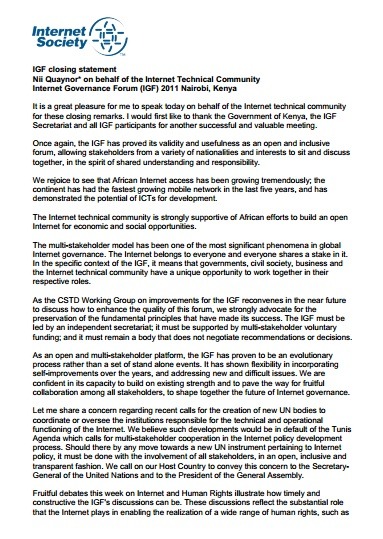Internet Governance Forum (IGF) 2011 Nairobi, Kenya
It is a great pleasure for me to speak today on behalf of the Internet technical community for these closing remarks. I would first like to thank the Government of Kenya, the IGF Secretariat and all IGF participants for another successful and valuable meeting.
Once again, the IGF has proved its validity and usefulness as an open and inclusive forum, allowing stakeholders from a variety of nationalities and interests to sit and discuss together, in the spirit of shared understanding and responsibility.
We rejoice to see that African Internet access has been growing tremendously; the continent has had the fastest growing mobile network in the last five years, and has demonstrated the potential of ICTs for development.
The Internet technical community is strongly supportive of African efforts to build an open Internet for economic and social opportunities.
The multi-stakeholder model has been one of the most significant phenomena in global Internet governance. The Internet belongs to everyone and everyone shares a stake in it. In the specific context of the IGF, it means that governments, civil society, business and the Internet technical community have a unique opportunity to work together in their respective roles.
As the CSTD Working Group on improvements for the IGF reconvenes in the near future to discuss how to enhance the quality of this forum, we strongly advocate for the preservation of the fundamental principles that have made its success. The IGF must be led by an independent secretariat; it must be supported by multi-stakeholder voluntary funding; and it must remain a body that does not negotiate recommendations or decisions.
As an open and multi-stakeholder platform, the IGF has proven to be an evolutionary process rather than a set of stand alone events. It has shown flexibility in incorporating self-improvements over the years, and addressing new and difficult issues. We are confident in its capacity to build on existing strength and to pave the way for fruitful collaboration among all stakeholders, to shape together the future of Internet governance.
Let me share a concern regarding recent calls for the creation of new UN bodies to coordinate or oversee the institutions responsible for the technical and operational functioning of the Internet. We believe such developments would be in default of the Tunis Agenda which calls for multi-stakeholder cooperation in the Internet policy development process. Should there by any move towards a new UN instrument pertaining to Internet policy, it must be done with the involvement of all stakeholders, in an open, inclusive and transparent fashion. We call on our Host Country to convey this concern to the Secretary-General of the United Nations and to the President of the General Assembly.
Fruitful debates this week on Internet and Human Rights illustrate how timely and constructive the IGF’s discussions can be. These discussions reflect the substantial role that the Internet plays in enabling the realization of a wide range of human rights, such as freedom of expression and opinion, as enshrined in Article 19 of the Universal Declaration of Human Rights.
Increased attempts by Governments around the world to control their citizen’s access and use of the global network, and often with disregard to the basic principles of human rights and due process, make it urgent to address these questions. We look forward to deepening these discussions at the IGF 2012.
In closing, on behalf of the Internet technical community, I want to thank you for the opportunity to participate in the IGF 2011. This year again, we measure the opportunity that is given to us – to collaborate under the United Nations umbrella with all stakeholders interested in making the Internet an opportunity for all. The Internet technical community is firmly committed to contributing to future successes of the IGF.
Thank you.
* Nii Quaynor, former Jonathan B. Postel Service Award recipient, spoke at the closing ceremony of the 6th annual IGF meeting in Nairobi,Kenya, 30 September 2011. On behalf of the Internet Technical Community, Quaynor commended the IGF as an open and inclusive forum, allowing stakeholders from a variety of nationalities and interests to sit and discuss together in the spirit of shared understanding and responsibility. He expressed praise for the multi-stakeholder model that brings together governments, civil society, business and the Internet technical community.
Quaynor raised concerns regarding recent calls for the creation of new UN bodies to coordinate or oversee the institutions responsible for the technical and operational functioning of the Internet. He stated, ?We believe such developments would be in default of the Tunis Agenda which calls for multi-stakeholder cooperation in the Internet policy development process. Should there by any move towards a new UN instrument pertaining to Internet policy, it must be done with the involvement of all stakeholders, in an open, inclusive and transparent fashion. We call on our Host Country to convey this concern to the Secretary- General of the United Nations and to the President of the General Assembly.
